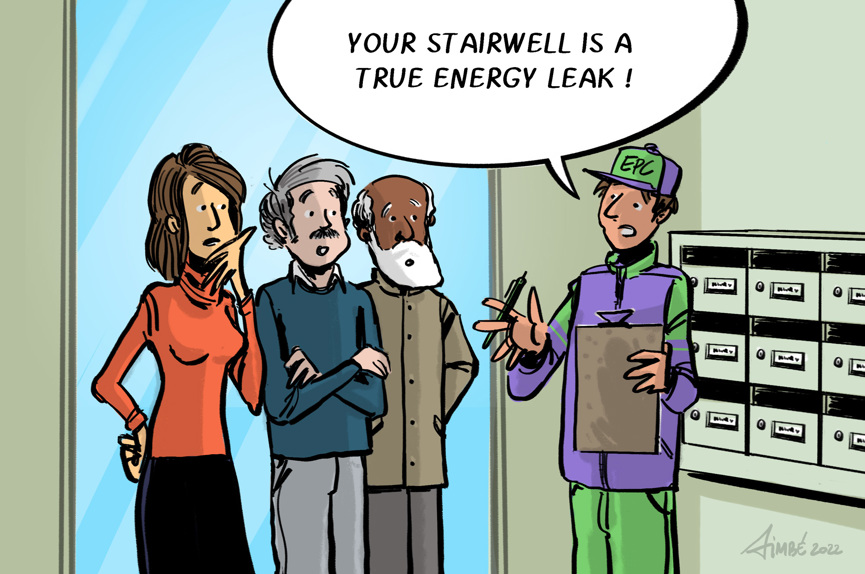- Construction Law , Real Estate, Renting and Co-ownership
- Paco Shen - Peter Moerman
- EPB , EPB-certificate , common parts , apartment building , energy consumption , residential building , energy expert , energy label , energy performance certificate , common parts energy performance certificate , law firm in Belgium , law firm in Brussels
The energy performance certificate (EPB-certificate) for common parts in an apartment building (hereinafter: EPB CP) indicates the extent to which an apartment building and its collective technical installations are energy efficient.
The obligation to have an EPC CP has been introduced in phases.
As from 1 January 2023, phase 2 will be introduced.
Read below what this exactly entails.

1. EPB-certificate in general
The energy performance of a building is the amount of energy actually consumed or deemed necessary for the various needs associated with a standardised use of a building. It covers heating, hot water supply, cooling, ventilation and lighting.
An EPB-certificate provides information on energy consumption with, in particular, the energy efficiency of a building and also contains a set of energy-saving recommendations.
2. Phased introduction
The obligation to have an EPB-certificate for common parts in an apartment building was introduced by the Energy Decree. For pragmatic reasons, the obligation was phased.
The following buildings must have an EPB CP:
- As from 1 January 2022, all apartment buildings with at least 15 building units, including at least two residential building units that are not themselves common parts;
- As from 1 January 2023, all apartment buildings with at least five building units, including at least two residential building units that are not themselves common parts;
- As from 1 January 2024, any owner of an apartment building consisting of at least two residential building units that are not themselves common parts.
Moreover, there is a deferral of the obligation for newly built apartment buildings. The obligation applies to newly built apartment buildings only ten years after an environmental permit for urban development acts was obtained. An EPB CP must be available within one month of the expiry of this period.
For example, if a new apartment building obtained environmental permit in 2015, the building will not have to have an EPB CP until 2025. Buildings that have undergone major energy renovation works obviously do not fall within the concept of new apartment buildings.
3. What does the energy performance certificate for common parts apply to?
An EPB CP relates to the common parts of an apartment building. The question arises as to which apartment buildings are subject to these obligations under the Energy Decree and what is meant by the common parts.
From 1 January 2023, if the building has at least five residential units where each unit has its own lockable entrance but forms a group of buildings, it can be considered an apartment building and an EPC GD must be drawn up. From 1 January 2024, this will apply to all apartment buildings that have at least two residential units.
When determining the number of units in the building, the actual condition should always be considered, which depends on the permits granted.
By contrast, the common parts consist of the enclosing shell parts (roof, external walls, lower floor, windows, doors, panels), the internal walls and floors between the individual units in the building and between the units and the common (circulation) areas, and the collective technical installations (cooling, space heating, domestic hot water, ventilation and solar energy installations).
If the apartment building consists of at least 5 units (this includes both residential and non-residential units), the lighting in the common circulation areas also belongs to the common parts.
Windows, doors, panels and individual installations of the residential units and installations that only serve the common areas such as the entrance hall do not belong to the common parts.
4. Who draws up the energy performance certificate for the common parts and what is its content?
The EPB CP can only be issued at the request of the association of co-owners or, failing this, an owner or the holder of a right in rem and their assignee, agent or property manager.
The property management agency seems to have an important role to play here, as it can be proactive by, among other things, putting all necessary decisions concerning the EPB CP on the agenda of the general meeting.
The EPB CP is then drawn up by a type A energy expert and must contain at least the following information:
- the date of issuance of the EPB-certificate;
- the identification details of the energy expert;
- the building-specific data, such as the address of the apartment building;
- the expression of the energy performance of the building based on an assessment of the characteristics of the envelope components and the installations;
- the unique code;
- the recommendations for the cost-effective improvement of the building's energy performance.
The energy expert prints the energy performance certificate, signs it and delivers it to the owner or co-owners' association of the apartment building. The owner of the apartment building or the association of co-owners of the apartment building shall provide the energy expert with all the data needed to prepare the EPB CP.
What is the validity period of the common parts energy performance certificate?
The EPB CP is valid for ten years from its issuance and expires in the following circumstances:
- an amended EPB has been drawn up; or
- at least 15% of the envelope of the apartment building is replaced, added or post-insulated; or
- the building's collective technical installations are replaced or a new one is installed.
However, if a new certificate is issued during the period of validity of an EPB CP, the consequence is that the remaining period of validity of the existing certificate expires.
When the validity period of the EPB CP expires, the co-owners' association must ensure that a new EPB-certificate is issued for the common parts by a type A energy expert:
- within six months of the end of works or the commissioning of an installation,
- within one month of the expiry date,
- in the case of new buildings, within one month of the expiry of a period of ten years following the date of the planning permission or the environmental permit for urban development operations.
Should you have any questions on this subject, please do not hesitate to contact our specialists at info@seeds.law or +32 (0)2 747 40 07.
Read also




